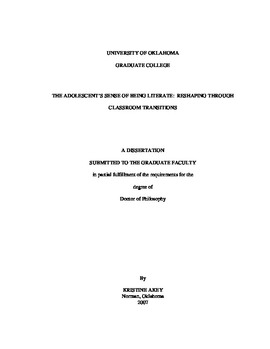| dc.contributor.advisor | Beach, Sara Ann, | en_US |
| dc.contributor.author | Akey, Kristine. | en_US |
| dc.date.accessioned | 2013-08-16T12:20:55Z | |
| dc.date.available | 2013-08-16T12:20:55Z | |
| dc.date.issued | 2007 | en_US |
| dc.identifier.uri | https://hdl.handle.net/11244/1267 | |
| dc.description.abstract | The study revealed that the students' sense of being literate was reshaped. The majority of the students described themselves as better readers and even more so as writers. Relationships and goal setting played key roles in this change. Relationships with teachers, friends or classmates helped them be successful with the more rigorous demands of the mainstream English class. Students recognized teachers' instructional decisions, such safe classroom talk, opportunities to write, and encouragement to practice literacy strategy use, as representative of good teaching, and this built students' trust in the teacher. The teacher-student relationships helped the students to feel good about themselves and their ability as readers and writers, therefore reshaping the students' literate identities. The students in this study admired and respected members of the mainstream class as more knowledgeable in reading and writing. They pursued these experienced students as a resource through relationships to support their success in school. This support not only informed the participants reading and writing but also cultivated acceptance and the identity of being a member of the classroom community as well as enhanced aspects of a positive self-efficacy. Through reflective, planful thinking, students identified what they believed was needed to be successful. The goal setting and the achievement of the goals reshaped students' identities in a cyclical manner. The conversations themselves between the interviewer and the participants provoked the process of goal setting and generated personal interest and focus. This metacognitive activity of asking questions about goals was set up because of the interview experience. As goals were achieved, student experienced success and their literate identity was reshaped. The implications from this study involve several educator groups, most directly teachers. As revealed in this study, relationships are important in the reshaping of students' identities, and teachers need to examine how their literacy practices build these relationships. Also teachers need to provide students with opportunities to set goals and to discuss these goals with teachers as to what is needed to achieve them. | en_US |
| dc.description.abstract | Sense of being literate embodies the individual's identity of who they are as literate individuals within their social world, and how they relate with others in a literate society. This study examined in what ways adolescents perceive their reading, writing and talking as a sense of being literate across two different class contexts. The students, six boys and five girls, transitioned into mainstream content English classes at the beginning of the school year after a district-level decision to eliminate the English credit reading support class. Phenomenological inquiry was used as the strategy to investigate the essence of the students' experience. Data sources included semi-structured audiotape interviews, personal notes, and the students' retrospective discussion of assignments. Data analysis entailed open coding to develop categories, application of codes to data, and creation of three matrices for each student using the code list categories within the broad areas of theory, identity, and self-efficacy to consolidate, organize, and express students' coded perceptions across time, noting commonalities or if change took place. | en_US |
| dc.format.extent | viii, 171 leaves : | en_US |
| dc.subject | High school students Oklahoma Attitudes. | en_US |
| dc.subject | Literacy Social aspects Oklahoma. | en_US |
| dc.subject | Language arts (Secondary) Social aspects Oklahoma. | en_US |
| dc.subject | Education, Reading. | en_US |
| dc.title | The adolescent's sense of being literate: Reshaping through classroom transitions. | en_US |
| dc.type | Thesis | en_US |
| dc.thesis.degree | Ph.D. | en_US |
| dc.thesis.degreeDiscipline | Department of Instructional Leadership and Academic Curriculum | en_US |
| dc.note | Source: Dissertation Abstracts International, Volume: 68-11, Section: A, page: 4647. | en_US |
| dc.note | Adviser: Sara Ann Beach. | en_US |
| ou.identifier | (UMI)AAI3284120 | en_US |
| ou.group | Jeannine Rainbolt College of Education::Department of Instructional Leadership and Academic Curriculum | |
